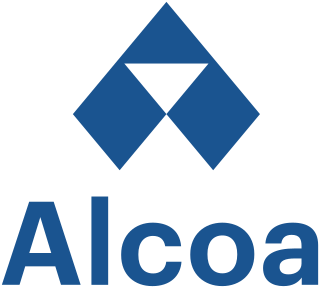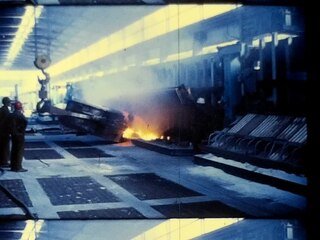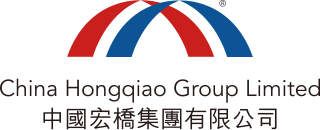
The economy of Iceland is small and subject to high volatility. In 2011, gross domestic product was US$12 billion, but by 2018 it had increased to a nominal GDP of US$27 billion. With a population of 387,000, this is $55,000 per capita, based on purchasing power parity (PPP) estimates. The 2008–2011 Icelandic financial crisis produced a decline in GDP and employment, which has since been reversed entirely by a recovery aided by a tourism boom starting in 2010. Tourism accounted for more than 10% of Iceland's GDP in 2017. After a period of robust growth, Iceland's economy is slowing down according to an economic outlook for the years 2018–2020 published by Arion Research in April 2018.
Rio Tinto Alcan is a Canada-based mining company. Headquartered in Montreal, Quebec, it is a subsidiary of global mining conglomerate Rio Tinto. It was created on 15 November 2007 as the result of the merger between Rio Tinto's Canadian subsidiary and Canadian company Alcan.

Alcoa Corporation is an American industrial corporation. It is the world's eighth-largest producer of aluminum. Alcoa conducts operations in 10 countries. Alcoa is a major producer of primary aluminum, fabricated aluminum, and alumina combined, through its active and growing participation in all major aspects of the industry: technology, mining, refining, smelting, fabricating, and recycling.

Aluminerie Alouette is an aluminum manufacturing company based in Sept-Îles, Quebec, Canada, on the North Shore of the Gulf of St. Lawrence.

The Alcan Lynemouth Aluminium Smelter was an industrial facility near Ashington, Northumberland, on the coast of North East England, 0.65 mi (1.05 km) south of the village of Lynemouth. The smelter was owned by the Canadian aluminium company Alcan, which is part of Rio Tinto. The smelter was opened in 1974 at a cost, which exceeded its budgeted estimate of £54 million, of $156 million. The plant ceased production in March 2012, and demolition of the facility was completed in March 2018.
Pechiney SA was a major aluminium conglomerate based in France. The company was acquired in 2003 by the Alcan Corporation, headquartered in Canada. In 2007, Alcan itself was taken over by mining giant Rio Tinto Alcan.

British Aluminium was an aluminium production company. It was originally formed as the British Aluminium Company Ltd on 7 May 1894 and was subsequently known as British Alcan Aluminium plc (1982-1996).
Articles related to Guinea include:
Aluminium in Africa originates from bauxite, and within Africa is primarily found in Guinea, Mozambique and Ghana. Guinea is by far the biggest producer in Africa, and is a world leader in bauxite production.

Aluminium smelting is the process of extracting aluminium from its oxide, alumina, generally by the Hall-Héroult process. Alumina is extracted from the ore bauxite by means of the Bayer process at an alumina refinery.

The Central Chubut Railway was a British-owned company that built and operated a 1,000 mmmetre gauge railway line in the Argentine province of Chubut in the Patagonia region at the end of the 19th. century.
The Bell Bay aluminium smelter is located on the Tamar River at Bell Bay, Tasmania, Australia. The smelter has a production capacity of 178,000 tonnes of aluminium per year. It is owned and operated by Pacific Aluminium, a wholly owned subsidiary of Rio Tinto Alcan.

Boyne Smelters is located on Boyne Island, Queensland, Australia, approximately 12 km south of the port of Gladstone. The smelter has a production capacity of 545,000 tonnes of aluminium per year. The operating company Boyne Smelters Ltd is 59.4% owned by Rio Tinto Alcan with the balance held by a consortium of Japanese participants including Sumitomo, Marubeni, Mitsubishi and YKK Group. 2011 saw the construction of a new carbon bake furnace to replace the original bake furnace.

Talum is a major Slovenian company based in Kidričevo and specialising in alumina and aluminium products with an annual production capacity of around 156,000 tonnes.
The Tomago aluminium smelter is located at Tomago, New South Wales, Australia, approximately 13 km west of Newcastle, within the Port Stephens LGA. The smelter has a production capacity of 590,000 tonnes of aluminium per year. It is operated by Tomago Aluminium Company, an independently managed joint venture owned by:

The Kurri Kurri aluminium smelter was located in Kurri Kurri, Australia and operated from 1969 until 2012. Developed by Alcan Australia Limited, the smelter experienced a change of ownership three times during its operations. Through gradual expansion, the smelter increased its production capacity from 30,000 tonnes per year (t/y) to 180,000 t/y of aluminium by the 1990s. The Kurri Kurri Smelter was engaged in operations in four areas; potlines for the melting of alumina, a cast house for casting of molten metal, a carbon plant for baking anodes, and anode plants for the manufacturing of carbon anodes.

Alcan was a Canadian mining company and aluminum manufacturer. It was founded in 1902 as the Northern Aluminum Company, renamed Aluminum Company of Canada in 1925, and Alcan Aluminum in 1966. It took the name Alcan Incorporated in 2001. During that time, it grew to become one of the world's largest aluminum manufacturers.

China Hongqiao Group Limited is a company founded in 1994 that specializes in the production of aluminium. Hongqiao is currently the second largest aluminium producer in the world after Chinalco. It is listed on the Hong Kong Stock Exchange with stock code 1378, and is incorporated in George Town, Cayman Islands.
Sohar Aluminium Company is the first Aluminium smelter in the Sultanate of Oman. Established in 2004, it is under the ownership of Oman Oil Company, Abu Dhabi National Energy Company PJSC – TAQA and Rio Tinto, a leading aluminium mining and production company. The company's annual production of primary aluminium is 375,000 tonnes per annum and it has a port facility for receiving and exporting aluminium and can support vessels with a capacity of at least 75,000 metric tonnes.












